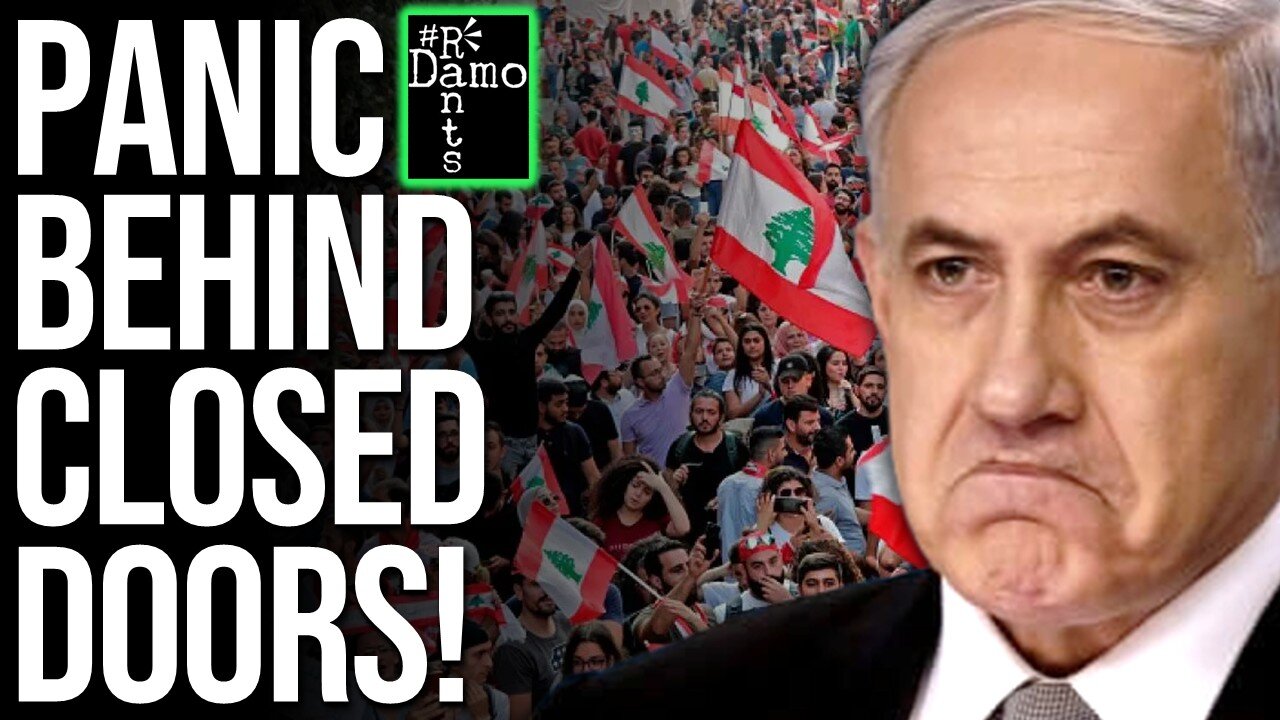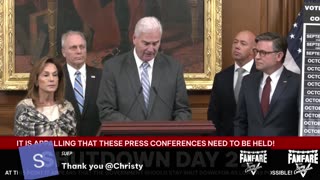Premium Only Content

Lebanon Was Supposed to Break – But It’s Israel That’s Losing Control
Right, so the Lebanon ceasefire with Israel. A ceasefire in name only as has been the case for almost a year now. But look at southern Lebanon or the Bekaa and you’ll see what’s actually happening. Israeli drones and jets have been back in the air, hitting asphalt plants, quarries, fuel tankers, private cars, even shattering school windows. Morris Tidball-Binz, the UN Special Rapporteur on extrajudicial executions, has already stated that unless Israel can prove those civilian objects had military use, these killings violate the right to life and may amount to war crimes. Israel has not presented that proof. And while the strikes continue, a U.S. envoy has stepped forward to explain the political terms: disarm Hezbollah or expect more of the same. So that’s the offer — give up the only deterrent to invasion, or watch the infrastructure of daily life ground into dust again. And they assume Lebanon won’t recognise the pattern.
Right, so the break became visible when a United Nations Special Rapporteur stated, in an on-the-record written communication, that Israeli strikes on civilian vehicles in Lebanon could constitute war crimes. Morris Tidball-Binz, the UN Special Rapporteur on extrajudicial executions, stated that unless Israel could prove military necessity, the strikes violated the right to life and may constitute war crimes. The reasoning was plain. Civilian objects are protected under international humanitarian law unless the attacking state can demonstrate a concrete military purpose. In the incidents under discussion, no such justification had been publicly presented. The rapporteur’s judgement was that the killings violated the right to life and the principles of precaution and proportionality. The language was specific, legal, and direct. Once that statement was issued, the frame shifted. These were no longer “border exchanges” or “security incidents.” They were unlawful killings during a period in which a ceasefire was formally in place.
In the days around that statement, the strikes intensified. Israeli drones and warplanes hit targets across southern Lebanon and the Bekaa Valley. They struck an asphalt factory near Ansar and Senay. They struck a quarry near the same area. They hit a diesel tanker. They struck a civilian car on a road in the Nabatieh district, killing and injuring people whose identities were confirmed by Lebanon’s Ministry of Public Health. They struck the outskirts of Shmestar, where the shock from the explosions shattered the windows of a school and injured children inside classrooms. These events were recorded by field reporters, by Lebanon’s state news agency, and by local authorities. None of these details rely on rumour, anonymous sources, or claims from unknown actors.
What links these targets is not military infrastructure. It is the material basis of daily life. The asphalt plant produces the road surface needed for transportation. The quarry supplies building materials. The diesel tanker feeds generators and farm machinery in a country where the electrical grid is unreliable, especially in the south. The civilian vehicles and agricultural transport allow people to work, move, deliver goods, and keep rural communities functioning. The school provides continuity in education and the basic structure of ordinary life.
Lebanon is not in a position of economic surplus. The country has endured a near-total banking collapse, a currency that has lost most of its value, and fuel shortages that have forced businesses and households to ration electricity, heating, and transportation. Under these conditions, the destruction of machinery and infrastructure does not just delay repairs. It deepens crisis. An excavator destroyed in a wealthy economy is replaced. An excavator destroyed in Lebanon remains a cratered shell, because the capital to replace it simply does not exist. A quarry damaged under stable economic conditions resumes production. A quarry damaged now remains idle, and construction slows or stops. The cost is not isolated to the hit site. It reverberates through supply chains, labour markets, and household budgets.
A strike on a beekeeping truck in southern Lebanon, reported by local media, is a good example. Beekeeping is part of the agricultural economy in the south. Honey production is an important source of income. Bees pollinate orchards and crops. Destroying hives disrupts ecological regeneration and food systems. A hit like that is not incidental. It targets the continuity of rural life.
This is where the stated justification and the observed outcomes diverge. Israel says it targets Hezbollah infrastructure embedded in civilian areas. Lebanon, residents, and multiple independent correspondents say the hits are striking civilian infrastructure and livelihoods. Under law, the state conducting the strike must demonstrate that the civilian object served a concrete military role. That demonstration has not been made publicly. The burden remains unmet. The strikes took place under a ceasefire that was supposed to prevent exactly this type of escalation. That makes the legal question sharper, not softer.
At the same time that the strikes intensified, a diplomatic message was delivered. The US envoy Tom Barrack stated that unless Lebanon disarms Hezbollah, a major confrontation with Israel could follow. Well Israel has been abusing a ceasefire for nearly a year, Lebanon ceased, they’re still firing and he threatens worse rather than criticising the breaches Israel is already guilty of? Thousands of them? There’s words for someone like Barrack but YouTube would have a fit if I said them. He described a disarmament framework supervised by the United States and France, with economic incentives attached. He said Lebanon rejected it due to Hezbollah’s influence in government. The message was framed as negotiation. The structure of the message was coercion though. It presented Lebanon’s internal security arrangements as subject to external approval. It linked Lebanon’s political sovereignty to the threat of war.
The military pressure and the diplomatic pressure are not separate events. They are coordinated instruments. The airstrikes degrade the infrastructure of daily life. The diplomatic statements apply political leverage. Together they attempt to force Lebanon into a position where disarmament appears to be the only way to prevent further destruction. The underlying assumption is that economic strain will translate into political pressure from the population against the resistance.
But the areas under attack are the same regions that have lived under occupation, bombardment, evacuation, and reconstruction before. The people who live there have seen this strategy applied over decades. They do not interpret the strikes as neutral “security measures.” They interpret them as attempts to force submission. And the political response has reflected that understanding.
Lebanon’s Speaker of Parliament Nabih Berri publicly confirmed that negotiations proposing a cessation of hostilities and border demarcation had collapsed, and that Lebanon would adhere to the mechanisms of the ceasefire instead. He emphasised that national unity between government, army, and resistance is essential. That was not rhetorical positioning. It was a strategic response to a coercive threat. When a country is pressured to restructure its internal security under threat of force, unity becomes a defensive posture in and of itself.
The campaign is built on the assumption that pressure will create division. The reality observed so far is that pressure is creating cohesion instead. The strikes targeting the infrastructure of life do not isolate the resistance. They reinforce the belief that resistance is necessary. Each strike confirms the premise that sovereignty cannot be protected by concession. And people don’t believe in the state army as they do in that resistance.
There is also the matter of documentation. The UN rapporteur’s statement was the beginning, not the end, of the legal record. Lebanese authorities recorded casualties and damage. Journalists documented impact sites. Field reports from the affected regions have consistent detail. These records will form the basis of legal and diplomatic arguments. Israel has faced such scrutiny before in Gaza and the West Bank. It knows the implications. The difference in Lebanon and as is the case right now in Gaza as well, is that these strikes are happening under a ceasefire. That increases the weight of the legal assessment.
European diplomatic sources have said that a large Israeli operation may be a matter of time. This is a signal that escalation is already underway. It’s not like Israel ever took this ceasefire seriously, much as seems to be the case in Gaza and indeed people there have said they fear a Lebanon-style ceasefire, because it fundamentally isn’t on in practice. It is also a signal that the political actors observing this escalation recognise the risks but are unable or unwilling to apply restraint. The language carries concern, not confidence.
The United States continues to position itself as both mediator and enforcer. It supplies the diplomatic cover that shields Israel from consequences while warning Lebanon of the price of refusal. This dual role is not contradictory by accident. It is a mechanism of control. Instability creates leverage. Leverage is used to impose political outcomes. Stability would remove that leverage.
So Lebanon is operating under severe economic and social strain. Striking the infrastructure that allows life to continue under such conditions is not incidental. It is strategic. The cost of each strike is multiplied by the fragility already in place. But fragility does not necessarily produce surrender. It can produce determination too. The memory of occupation, bombardment, and reconstruction is long in Lebanon. These communities do not respond to external pressure by abandoning their land. They tighten their social ties.
The campaign was built on the belief that Lebanon would break. As far as its leadership goes, that might not be a mislaid belief, but the evidence is also there, especially amongst ordinary Lebanese people, showing the opposite.
The situation is not stable. It is not resolved. It is moving. What happens next depends on whether the policy architects recognise that the strategy they designed is no longer achieving the outcomes they intended.
To understand why the strikes have not produced the political effect their architects anticipated, the economic and social context needs setting out clearly. Lebanon is not entering this moment from a position of normalcy. The country has experienced one of the most severe financial collapses of the 21st century. The banking sector imploded. Depositors lost access to their savings. The national currency lost the majority of its value. The state’s electricity system disintegrated to the point where most households rely on private generators powered by diesel fuel. Municipalities struggle to maintain basic services. Many villages in the south and Bekaa have been sustaining themselves through local networks, remittances, and community-level resource pooling.
In such conditions, infrastructure like asphalt plants and quarries are not simply industrial sites. They are the backbone of the ability to repair roads, maintain agriculture, rebuild homes, and keep trade routes functioning. When those are destroyed, the cost is not temporary interruption. It is deeper economic paralysis. A destroyed asphalt plant means roads cannot be resurfaced. If roads degrade, transport slows. If transport slows, farmers cannot reach markets, workers cannot travel, and basic goods become more expensive. A destroyed quarry means construction materials become scarce or expensive. That, in turn, slows the rebuilding of homes damaged in previous shelling and storms. It also slows new housing projects and agricultural infrastructure. These costs fall not on the state treasury—already hollowed out by national economic crisis—but directly on families and municipalities.
The diesel tanker strike must also be understood in this context. Diesel is not a luxury fuel in Lebanon. It is the basis for electricity generation in homes, hospitals, bakeries, farms, and schools. Destroying diesel reserves during fuel scarcity is a direct hit on a country’s ability to keep its most basic systems running. It raises household electricity costs. It disrupts refrigeration of food. It undermines hospital equipment. You can begin to see the parallels with Gaza now can’t you? It sets back agricultural production that depends on irrigation pumps. None of these effects need to be stated rhetorically. They are straightforward material consequences. Israel hasn’t had to level Lebanon as it has done in Gaza, to produce similar effects.
When the United States envoy says Lebanon has been offered economic incentives in exchange for disarmament, this is the economic terrain on which that offer lands. The message is: give up the armed force that deters external attack and, in exchange, the economic crisis might ease. This is not a negotiation conducted between equals. It is a negotiation structured through deprivation. The economic leverage would not exist without the collapse of the banking system and the fragility of state infrastructure. When the same actors who express concern over Lebanon’s economic state also back the military strikes deepening that economic harm, it is clear the crisis is being treated not as a humanitarian problem but as a pressure instrument.
The political system in Lebanon has many flaws. No one living in the country is unaware of this. But the current configuration in which the national army, the resistance, and the government coordinate on border defence is not an accident. It is the result of prior invasions, occupations, and confrontations. It exists because no single institution in Lebanon has ever been able to unilaterally protect the border against a militarily superior adversary. This is not a point of ideology. It is a point of recorded history.
When the United States envoy calls for disarmament supervised by foreign powers, he is not proposing a security reform. He is proposing the removal of Lebanon’s deterrent capability under conditions of ongoing threat. The strikes on civilian and economic infrastructure are what make that proposal appear urgent. The message being delivered is that the cost of maintaining resistance is destruction, and the cost of surrender is relief. But the communities under attack are the same communities that lived through the years when there was no deterrent force at all. They remember what happened then. They remember what happened when Israel invaded before and they didn’t have that. Those are lived memories.
This is why the recent strikes are not generating the political pressure the United States and Israel expect. Economic pain is real. Social strain is real. But they are not being interpreted as the result of internal political choices. They are being interpreted as the result of external coercion. And when people experience coercion, they do not demand that their defenders step down. They demand that they remain in place.
The Lebanese parliament speaker’s statements reflect this reality. He did not frame the situation as a clash of visions within Lebanon. He framed it as a confrontation imposed from outside. He linked adherence to the ceasefire mechanism directly to national sovereignty. And he made clear that negotiations had collapsed because Israel rejected proposals that would have set the groundwork for de-escalation.
Inside Lebanon, political actors who disagree on a wide range of economic and social policy questions are aligning around a single point: the right of Lebanon to define its own security arrangements. We hear Israel talk of national security all the time, but what of Lebanon’s right to that here? It’s non existent. This is not ideological alignment. It is defensive alignment. It is the recognition that when external actors seek to determine the composition of a state’s internal security forces, the state is no longer sovereign. I’ve spoken about sovereignty a number of times in recent videos, there is a common theme around the world from Lebanon to Palestine to Venezuela and Colombia where sovereignty is being undermined for a desired outcome.
So in this environment, every strike on infrastructure confirms the perception that the pressure is aimed not at armed combatants but at the society that sustains them. Every destroyed workshop, road, or agricultural vehicle is read as evidence that the objective is to make life untenable. And because of that reading, the strikes do not separate the population from the resistance. They solidify the connection.
The United States is aware of these dynamics. It publicly warns of the danger of escalation while continuing to provide the diplomatic cover that enables the strikes. The dual message is deliberate. It is intended to pressure Lebanon into making internal changes to avoid further harm. But the logic is breaking down. The social networks that sustain communities in the south—family ties, remittances, cooperative farming, religious institutions, social solidarity—have been built through decades of hardship. They do not collapse when material conditions worsen. They intensify.
Which brings us to Israel’s strategic assumption. The campaign presumes that Lebanon is brittle. That economic strain will cause social fracture. That social fracture will lead to political realignment. That political realignment will isolate the resistance. That isolation will make disarmament feasible. The evidence available does not support this chain of causation. The result is the reverse: pressure is producing cohesion.
But cohesion is not stability in and of itself. It is endurance. And endurance under bombardment carries a cost. The cost is borne by households, workers, farmers, municipal administrators, and families rebuilding lives repeatedly interrupted by conflict. This cost is not invisible. It is understood at every level of Lebanese society. But it does not translate into political surrender. It translates into persistence.
The campaign’s second assumption—that disarmament under pressure will produce regional stability—is also failing. A large-scale military operation against Lebanon, acknowledged as a possibility by European diplomatic sources, would not produce quiet. It would risk opening multiple fronts and drawing in regional actors. The idea that Lebanon will disarm to avoid that outcome misunderstands the basic premise of deterrence. Deterrence exists because the threat exists. Remove deterrence, and the threat increases. If this comes to pass Hezbollah having sat on their arms will almost certainly pick them up again and be seen widely in Lebanon to be justified in doing so and what of the UN Peacekeeper force UNIFIL in which case? Would this not be another direct threat against them and an undermining of UN Resolution 1701, seemingly supported by the US all the way?
The situation is therefore caught between escalation and recognition of failure. To escalate risks a broader conflict. To recognise failure requires a shift in strategic thinking that has not occurred. The result is continuation of a campaign that is not achieving its stated goals and is deepening the conditions that will sustain its opposition.
To understand where this leads, we have to widen the frame beyond the border itself. Lebanon is not being pressured in isolation. The same logic — destroy the basis of daily life, condition reconstruction on political compliance, define sovereignty as negotiable — has been applied in Gaza, in parts of the West Bank, and in previous phases of Lebanon’s own modern history. The difference now is that the strategy is unfolding in a context where the population targeted already recognises its structure. Nothing about the current campaign is unfamiliar to them. They have seen what follows disarmament under duress, and they have lived through what happens when the capacity to deter invasion is removed.
This is why the strikes carry a strategic cost for Israel that is still accumulating. The campaign does not appear to be disrupting the resistance’s command structure. It is not producing internal political rupture. It is not creating a crisis of legitimacy for the resistance. Instead, it is reinforcing the perception that the resistance is necessary to prevent territorial loss and forced displacement. This is especially significant given that Lebanese political actors have explicitly stated that Israel’s objective in previous escalations included attempting to reoccupy territory south of the Litani River. When political leaders say that these plans were thwarted through armed deterrence, they are not speaking in rhetorical terms. They are referencing what they regard as documented military intent.
The strikes, therefore, do not simply harm. They clarify. They show the population who is attempting to determine the conditions of their life, movement, rebuilding, and security. And because those actions are understood as external impositions, the internal political space does not fracture. It closes ranks.
This has direct consequences for the 2026 parliamentary elections. Lebanon’s electoral system is structured around confessional representation, local power bases, and regional loyalties. The areas now being bombarded are also areas that contribute significantly to the electoral strength of parties aligned with the resistance. The strikes do not weaken that strength. They intensify it. A population under attack does not shift away from the actors defending it. It becomes more committed to them. If the campaign was intended to reshape the electoral landscape, it is shaping it in the opposite direction.
Tom Barrack’s statement that failure to disarm Hezbollah could delay the 2026 elections was notable. It signalled a willingness to link electoral sovereignty directly to compliance with external security demands. It also suggested that political timelines inside Lebanon are being treated as variables subject to strategic pressure. But elections held under threat are not experienced as exercises in civic participation. They are experienced as referenda on sovereignty. Again we circle back to that point. The more direct the threat, the less room there is for internal political realignment to occur peacefully. In this sense, the pressure campaign is not only ineffective — it is destabilising the very conditions under which electoral legitimacy can exist.
The legal dimension is also developing. The UN rapporteur’s statement was a formal entry point. Documentation is ongoing. Lebanese ministries, civil society networks, and international legal monitors are recording dates, coordinates, damage patterns, and casualty details. The strikes took place under a ceasefire, which means they are not interpreted through the same legal framework as open war. The threshold for illegality is lower, and the evidentiary burden is easier to meet. The significance of this is not immediate. International accountability as we know is bloody slow. But it is cumulative. The record established now will shape diplomatic relations, arms sale debates, and international legal filings in the future.
Israel’s long-term strategic position depends heavily on diplomatic support from the United States and Europe. It depends on the ability of its allies to defend its actions in international forums and to block or weaken resolutions that challenge its conduct. If the pattern of strikes in Lebanon continues, and if the documentation remains as clear as it currently is, the cost of maintaining that diplomatic cover will rise. States with domestic constituencies sensitive to international law will find it harder to justify. And as the gap between official rhetoric and documented action widens, the credibility of the justifying narratives erodes.
Meanwhile, the campaign is also producing consequences beyond Lebanon’s borders. Other regional actors are observing the situation closely. The assumption that coercive pressure can dismantle entrenched armed movements is being tested. So far, it is failing. And I think that is rather instructive. It shows that military superiority alone does not produce strategic outcomes when the targeted society has already integrated resistance into its identity and survival practices.
Therefore this brings all of the analysis we’ve gone over to one central strategic contradiction. Israel’s security doctrine is built around deterrence through force — demonstrating military capability to impose costs on adversaries. But deterrence through force depends on the adversary valuing what is threatened more than what is defended. In Lebanon, this calculation does not hold. The social structures sustaining resistance do not rely on state-led reconstruction, or foreign capital flows, or external guarantees. They rely on local networks, community institutions, and political identity shaped by historical experience. When force is applied, it does not eliminate these structures. It reinforces them.
Israel can escalate. It has the means and goodness knows the US will keep supplying more of that. But escalation does not guarantee strategic victory. A ground operation in the south of Lebanon would carry significant risk of extended conflict with unclear endpoints, which is what led to the current ceasefire to begin with. It would invite regional intervention. It would strain diplomatic alliances. It would deepen the documentation of harm. The gains would be uncertain, certainly Israel was seen to have lost previously and further losses would no doubt be immediate.
On the other hand, de-escalation would require acknowledging that Lebanon’s internal security arrangements reflect sovereign choice, not foreign imposition. That their national security and sovereignty does matter. It would require treating resistance not as a removable anomaly but as an embedded reality that isn’t for external actors to determine the right to exist or not. It would require negotiation rather than conditionality and given what is happening and has happened throughout this ceasefire, good luck with that one. Why should Lebanon trust those of you threatening it now, promising respect and being seen as equals later?
And so the situation continues. Airstrikes on infrastructure that keeps communities functioning. Diplomatic statements linking relief to disarmament. Internal political unity as a defensive response. Legal scrutiny building. Regional actors watching. Elections approaching under pressure. And the assumption that Lebanon will bend remains in place, despite the evidence showing it will not.
The campaign is not weakening the resistance. It is legitimising it. The strikes are not fracturing Lebanese society. They are reinforcing the view that sovereignty must be defended. The diplomatic threats are not forcing compliance. They are demonstrating the extent of external interference.
The strategy is producing the opposite of its intended effect.
There is no stable path forward under this approach. Continued pressure increases cohesion, legal exposure, and reputational damage in the country. Escalation risks regional conflict. De-escalation requires acknowledging the failure of coercion.
The question is not whether these conditions will change, they’re unlikely to. The question is whether those applying the pressure will recognise that the outcome they sought is already lost.
This is where the situation stands now. The campaign is underway. The documentation is building. The resistance endures. The society absorbs. The state holds its position. And the policy that aimed to break Lebanon is, once again, confirming why Lebanon learned to resist in the first place.
Of course its not only from a position of coercion and the threat of war where Israel is falling on its face with regards to Lebanon, its happening from a legal standpoint too, so get all the details of that story in this video recommendation here as your suggested next watch.
Please do also hit like, share and subscribe if you haven’t done so already so as to ensure you don’t miss out on all new daily content as well as spreading the word and helping to support the channel at the same time which is very much appreciated, holding power to account for ordinary working class people and I will hopefully catch you on the next vid. Cheers folks.
-
 LIVE
LIVE
Redacted News
59 minutes ago"Their goal is CIVIL WAR in the U.S." Americans Fighting Over SNAP Food Stamps | Redacted News
16,495 watching -
 1:12:02
1:12:02
vivafrei
2 hours agoThe Rise of Mamdami & the Fall of New York! Ice Activits ARRESTED! Ostrich Farm UPDATE! & More!
72.9K37 -
 16:31
16:31
Clintonjaws
5 hours agoICE Rioters Getting Arrested - This Is Priceless
4.07K5 -
 1:05:34
1:05:34
The Quartering
3 hours agoJob Economy Collapsing, Food Wars Start Friday & The War On Tucker Carlson
105K33 -
 LIVE
LIVE
Barry Cunningham
2 hours agoPRESIDENT TRUMP EVENTS IN SOUTH KOREA | MIKE JOHNSON SHUTDOWN DAY 29 PRESSER | MORE NEWS!
1,707 watching -
 LIVE
LIVE
The HotSeat
1 hour agoAmerican Politics Are Really NOT This HARD!!!!
603 watching -
 2:19:30
2:19:30
Side Scrollers Podcast
6 hours agoAngry Joe’s TDS/Halo Meltdown + Console War is OVER + Twitch Staff FIRED + More | Side Scrollers
45.6K9 -
 1:13:46
1:13:46
DeVory Darkins
4 hours agoDemocrat Voters get CRUSHING NEWS as Trump celebrates MAJOR TRADE DEAL
129K54 -
 14:54
14:54
The Kevin Trudeau Show Limitless
6 hours agoThe Hidden Force Running Your Life
14.6K6 -
 1:00:11
1:00:11
Mark Kaye
4 hours ago🔴 Joe Biden Autopen Scandal Update - Staff Paid MILLIONS To Keep Quiet!
26.4K4